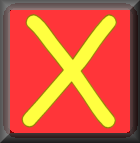
 |
Algebraic FractionsA mixture of algebraic fraction calculations and simplifications. |
This is level 2; Multiplying and dividing algebraic fractions. You can earn a trophy if you get at least 9 correct.
InstructionsTry your best to answer the questions above. Type your answers into the boxes provided leaving no spaces. As you work through the exercise regularly click the "check" button. If you have any wrong answers, do your best to do corrections but if there is anything you don't understand, please ask your teacher for help. When you have got all of the questions correct you may want to print out this page and paste it into your exercise book. If you keep your work in an ePortfolio you could take a screen shot of your answers and paste that into your Maths file. |
||
|
|
||
|
|

|
More Activities: |
|
Mathematicians are not the people who find Maths easy; they are the people who enjoy how mystifying, puzzling and hard it is. Are you a mathematician? Comment recorded on the 7 April 'Starter of the Day' page by Marta, Rosea: "Hello! I wanted to comment that these starters always brighten my day. My students and I are very grateful to have access to these resources. Thank you!" Comment recorded on the 17 June 'Starter of the Day' page by Mr Hall, Light Hall School, Solihull: "Dear Transum, |
Each month a newsletter is published containing details of the new additions to the Transum website and a new puzzle of the month. The newsletter is then duplicated as a podcast which is available on the major delivery networks. You can listen to the podcast while you are commuting, exercising or relaxing. Transum breaking news is available on Twitter @Transum and if that's not enough there is also a Transum Facebook page. |
|
AnswersThere are answers to this exercise but they are available in this space to teachers, tutors and parents who have logged in to their Transum subscription on this computer. A Transum subscription unlocks the answers to the online exercises, quizzes and puzzles. It also provides the teacher with access to quality external links on each of the Transum Topic pages and the facility to add to the collection themselves. Subscribers can manage class lists, lesson plans and assessment data in the Class Admin application and have access to reports of the Transum Trophies earned by class members. If you would like to enjoy ad-free access to the thousands of Transum resources, receive our monthly newsletter, unlock the printable worksheets and see our Maths Lesson Finishers then sign up for a subscription now: Subscribe |
||
Go MathsLearning and understanding Mathematics, at every level, requires learner engagement. Mathematics is not a spectator sport. Sometimes traditional teaching fails to actively involve students. One way to address the problem is through the use of interactive activities and this web site provides many of those. The Go Maths page is an alphabetical list of free activities designed for students in Secondary/High school. Maths MapAre you looking for something specific? An exercise to supplement the topic you are studying at school at the moment perhaps. Navigate using our Maths Map to find exercises, puzzles and Maths lesson starters grouped by topic. | ||
Teachers | ||
|
If you found this activity useful don't forget to record it in your scheme of work or learning management system. The short URL, ready to be copied and pasted, is as follows: |
Alternatively, if you use Google Classroom, all you have to do is click on the green icon below in order to add this activity to one of your classes. |
It may be worth remembering that if Transum.org should go offline for whatever reason, there is a mirror site at Transum.info that contains most of the resources that are available here on Transum.org. When planning to use technology in your lesson always have a plan B! |
|
Do you have any comments? It is always useful to receive feedback and helps make this free resource even more useful for those learning Mathematics anywhere in the world. Click here to enter your comments. |
||
Close

Level 1 - Simplifying algebraic fractions.
Level 2 - Multiplying and dividing algebraic fractions.
Level 3 - Adding and subtracting two algebraic fractions.
Level 4 - Simplifying algebraic fractions by factorising.
Level 5 - Mixed algebraic fraction questions.
Exam Style questions are in the style of GCSE or IB/A-level exam paper questions and worked solutions are available for Transum subscribers.
More on this topic including lesson Starters, visual aids and investigations.
Answers to this exercise are available lower down this page when you are logged in to your Transum account. If you don’t yet have a Transum subscription one can be very quickly set up if you are a teacher, tutor or parent.
See the National Curriculum page for links to related online activities and resources.
Don't wait until you have finished the exercise before you click on the 'Check' button. Click it often as you work through the questions to see if you are answering them correctly. You can double-click the 'Check' button to make it float at the bottom of your screen.
Answers to this exercise are available lower down this page when you are logged in to your Transum account. If you don’t yet have a Transum subscription one can be very quickly set up if you are a teacher, tutor or parent.
Close

Robynn Hofmeyr, South Africa
Wednesday, May 29, 2024
"Hi, I'm a new user so this may be a silly question, but in the Algebra, how do I equate the Transum levels to school lelels? EG: What grade is Level 5? Thank you.
[Transum: That's a great question, and it's not silly at all. The levels in our Algebra exercises, as well as in other topics, are designed to reflect the stages of learning within that specific topic rather than correlating directly with school grade levels or Year groups. This means that a Level 5 in one topic, such as Tally Charts, might be significantly easier than a Level 1 in another topic, such as Differentiation.
Each level is intended to help students build their understanding progressively within the context of that particular subject. For instance, Level 5 of Tally Charts might cover more basic concepts compared to Level 1 of Differentiation, which starts with more advanced principles of calculus.
I hope this clarifies how the levels are structured. If you have any more questions or need further assistance, please don't hesitate to ask.]"